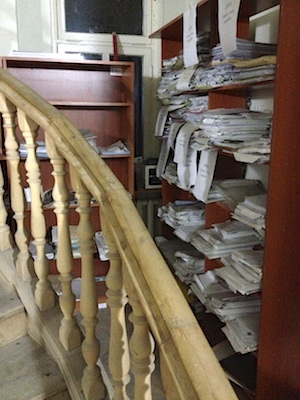 An aspiring government watchdog in Armenia faces an uphill battle. Weak safeguards against corruption and a government-dominated media have led to widespread distrust of elected officials and most news outlets. A recent Open Society Foundations report cites the country for "lack of independence of regulatory institutions, non-transparent media ownership," and a slow-developing media sector.
An aspiring government watchdog in Armenia faces an uphill battle. Weak safeguards against corruption and a government-dominated media have led to widespread distrust of elected officials and most news outlets. A recent Open Society Foundations report cites the country for "lack of independence of regulatory institutions, non-transparent media ownership," and a slow-developing media sector.
Levon Barseghyan, activist and founder of the Journalists Club Asparez, says mainstream media has so little credibility that Armenians watch state TV using "a vice versa approach."
Asparez (or "Arena") hosts one of the country's top 10 news web sites, Asparez.am. To foster public knowledge and government accountability, they are also tracking public funding to schools and regional governments, then posting and charting the results online at PublicData.am.
The RightsCon summit presented by digital human rights champions Access, included an inspiring range of panels and panelists. I liveblogged a handful of sessions, including "Anonymity, Pseudonymity, and Freedom of Expression," which had an extraordinary concentration of brainpower. These notes are not perfect, but capture many of the smart and instructive points the group made. Colin Crowell, who leads on public policy at Twitter, led off by introducing all the session panelists. aestetix, co-founder of NymRights, is a policy advocate, technologist, speaker, and researcher working in the identity "ecosystem." Crowell praised Vince Sollitto from Yelp for his "sterling" communications policy background in business and the private sector. Vince began on Capitol Hill and also served as spokesman to under Governor Arnold Schwarzenegger. Eva Galperin from EFF stepped in for Karen Reilly of the Tor project, who was unable to join. Eva worked on the real name policies at Google+ and…
Cross-posted from the #TABridge blogWhen librarians speak out in protest, you know something serious is going on. That's what happened last month amid the public outcry after a U.S. appeals court supported telecom giant Verizon in its lawsuit against net neutrality regulations.The American Library Association said the ruling "if it stands ... will fundamentally change the open nature of the Internet, where uncensored access to information has been a hallmark of the communication medium since its inception."Net neutrality's underlying principle is that the speed, cost and availability of your Internet service cannot change based on which site you try to reach. On a neutral Internet, providers "treat all bits equally," Global Voices co-founder Ethan Zuckerman wrote in 2006.The court's January ruling said, in simplified terms, that the Federal Communications Commission was seeking to regulate cable companies and phone companies the same way, even though current regulations impose a clear distinction between the two groups. (Some pro-neutrality critics also…
An interesting thing happened today in the debate over US and UK berserker surveillance practices. In a collective protest, human rights, civil rights and accountability groups sent a letter to the Open Government Partnership calling on member countries to "overhaul privacy laws, protect whistleblowers, and increase transparency on surveillance mechanisms."The way OGP works, governments submit "action plans" with a roster of commitments to improve transparency, accountability and citizen participation. Many of the plans emphasize improved Freedom of Information, open data and rule of law mechanisms. OGP has generated a lot of energy. It has kickstarted a conversation about accountability on the international stage and among the 62 participating countries. But it has yet to prove its power to unleash change. Declarations are easier than prosecutions. Open data portals look good, but data means little without a community of data-savvy reformers.So it is interesting to see that more than 100 groups and…
What if data published by governments had tracked changes and comments turned on like a Word document--for every user? That is basically the question asked the other day by Gov 2.0 evangelist Ben Balter. It's a valuable idea, driven by several urgent needs in the open data world: more usable government data, more engaged data users, and a more fluid, accountable dialogue between data publishers and data users. And Balter stands at the forefront of the issue, having pioneered the federal government's earliest uses of GitHub, the socially-oriented software platform, and now working with GitHub to help lead its new focus on state, local and federal government usage. The vision in his post is lucid and compelling, but the proposal is off the mark. We need better conversations more than we need better annotations. More precisely, we'll get more users to give more feedback that is more useful to more government data publishers if we…